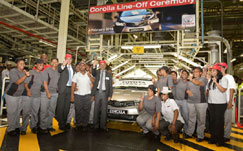by Mustaqeem de Gama
IN JULY 2010, the Cabinet approved a range of measures to update and modernise South Africa’s investment policy framework in line with international law standards.
This occurred against a changing international backdrop that saw fundamental changes to investment regimes and coincided with urgent international calls from both civil society and government circles for the reform of international investment treaties, their underlying policy frameworks, and the legal frameworks for adjudication and enforcement of investment agreements.
South Africa’s recently released Investment Promotion and Protection Bill responds to this dynamic and provides broad guarantees to all investors.
There are various perceptions that the draft bill falls short of acceptable international standards.
This is not so. The draft bill, released for public comment in November, specifies that all foreign investors are protected irrespective of whether a bilateral investment treaty (BIT) exists between their home country and South Africa. The draft bill also embeds non-discrimination by providing national treatment for all foreign investors.
While there is no reference to the investment law standard known as "fair and equitable" treatment, all investors have access to procedural and substantive due process provided for by the South African constitution.
The constitutional dispensation on expropriation, as set out in the draft bill, is very much in line with international law. Market value is still a determining factor in the calculation of damages. In respect of indirect expropriation, nothing in the draft bill deviates from international best practice. Instead, it draws from innovations in new-generation investment agreements that countries such as the US, Canada and Japan are concluding.
The US, for example, has changed its model BIT to specify that any reference to "fair and equitable treatment" must align to the customary international law minimum standard of treatment for foreigners (which the draft bill complies with); circumscribes indirect expropriation; and refines the definition of "investment" and contains a self-judging essential security clause. In short, there is nothing unusual about the provisions in the draft bill.
Increasingly, investment treaties and national investment laws now routinely carve out regulatory space for governmental actions implemented to achieve public interest objectives.
The draft bill confirms that investors have access to numerous remedies for any violation of their investments by the state. Arbitration legislation has now been updated, and two draft bills covering domestic and international arbitration are ready for public comment.
In recent years, the legitimacy of the international arbitration system has been questioned, raising concerns about its neutrality. Recurring episodes of inconsistent findings and divergent interpretation of identical of similar treaty provisions are common. Erroneous decisions on important questions of law are made without the possibility of effective review or appeal.
The fragmentation of international law in general and the particular nature of investment arbitration necessitate some uniform norms. However, every arbitral award is binding on the parties to the dispute only, and in the absence of a binding system of international precedent, concerns about the legitimacy, transparency and predictability of the international investment arbitration system will continue.
Arbitration costs have escalated alarmingly in recent years and have become prohibitive, where 82% of the cost of a case was said in a recent publication by the United Nations (UN) Conference on Trade and Development to be composed of legal fees, with an average cost exceeding $8m per case.
States are exposed to liability for legitimate public interest measures that run into billions of dollars.
A recent publication by the UN Conference on Trade and Development puts the number of cases at 450 in 2011, and by 2012 there were at least 40 known cases where $1bn or more was claimed by investors. Therefore, international arbitration is not a panacea in light of the many structural and institutional problems that exist within the international investment law system. International arbitration cannot replace domestic law as the primary legal framework for the regulation of investor-state relations.
• De Gama is a director in the Department of Trade and Industry.
Business Day is a national daily newspaper in South Africa, published from Monday to Friday and also available as an e-paper. It is edited by Peter Bruce and published by BDFM Publishers, which is also the parent company of the Financial Mail magazine and Business Day TV. BDFM Publishers is owned by Times M



